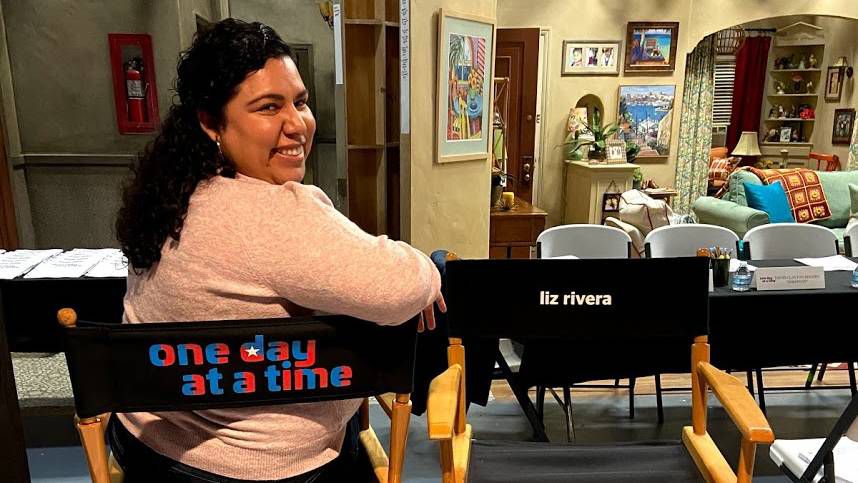LOS ANGELES — Hollywood has long struggled with a lack of representation. It has been said before that what Americans see on their screens does not represent what the country looks like.
According to the Pew Research Center, in 2019, the number of Hispanics in the United States reached a record 60.6 million, or 18% of the population.
What You Need To Know
- While people of color have made strides in front of the camera, more work needs to be done behind the scenes, one Hollywood writer observed
- Liz Rivera is a writer on the critically acclaimed hit show, One Day at a Time
- Rivera said it is important to realize people of color can also write, produce, and direct stories outside the Latinx community
- For Rivera, comedy is a universal language, and she uses her art to bridge the discrepancies
Over the past few years, except for 2020 due to the pandemic, the box office has felt the impact of all Asian, all-Black casts. Take, for example, titles like Black Panther and Crazy Rich Asians.
While people of color have made strides in front of the camera, what about behind the scenes?
Liz Rivera is a writer on the critically acclaimed hit show, One Day at a Time. She also wrote the companion book, Miguel’s Music, for Disney’s Academy Award-winning film, Coco.
Rivera said it is not just important to see representation on screen but also to show that people of color can write, produce, and direct stories outside the Latinx community.
“Latinx writers and producers should not be put into a bubble that is only about telling Latinx stories. They live and work in the country. They are more than capable of also writing about the American life,” she said.
Rivera was born in Guatemala and was just a baby when her family immigrated to the United States.
Like many young Latinx who are born in another country but raised in the United States, she has felt “ni de aquí, ni de allá” (not from here, not from there).
It is a limbo feeling many in the Latinx community can relate to, but Rivera said she has a firm grasp on her identity.
“I feel very American. We are Latino Americans, and that is its own unique experience,” she said.
For many Latinx community members, like Rivera, Hollywood does not just have a problem hiring people of color; it also has a problem with how it portrays communities of color.
“The Latino tropes that Hollywood returns over and over always seems to be gang story, a poor family story, and immigrant deportation story. Those stories are real. They exist and are important. Latinos, however, are more nuance than that,” she said.
Shows like One Day at a Time are critical because they introduced the Latin American culture to a broader audience. As audiences grow to appreciate them, the hope is that the demonization of the Latinx community and other communities of color can fade in Hollywood.
“It’s not that the Latinx community isn’t loved or appreciated, it’s that the American community has yet to learn how to embrace the Latinx community in the United States. I hope we continue to see different stories told and that America does embrace us. Our contributions are very valuable and important – they deserve to be acknowledged and celebrated,” said Rivera.
For Rivera, comedy is a universal language, and she uses her art to bridge the discrepancies.
“If the audience does not like one joke, it is okay because there are 100 other jokes in the script,” she said. “If you are part of the Latino community, I am writing those jokes for us, for you to enjoy. There are still the every day-to-day jokes that will speak to everybody.”
The writing room at One Day at a Time could be used as an example to follow due to the representation within it, according to Rivera.
“It is a well balanced room. Besides having a Latino family at its core, the show has embraced having so many people from different backgrounds. It’s what helps the show be so funny and so sharp. We can draw on those things,” said Rivera.
A recent UCLA study found four key points:
- Women hold only 32% of studio chair and CEO jobs, but minorities have just 8%.
- Only 24% of credited writers are minorities, and only 21.8% of episodes were directed by minorities between and 2019 – across broadcast, cable, and digital.
- Representation of women and minorities in acting roles improved since the same study was conducted a year earlier.
- Ratings and social media engagement data showed that audiences respond to diversity.
Whether Hollywood is ready should by now be obsolete, Rivera said. The reality is Hollywood gatekeepers need to turn the key and open the doors of inclusivity and correct portrayal. People of color need to be let in as writers, producers, and talent.
“Latino television writers can also write on shows that don’t have Latinos characters. Hire us! You want more of us, hire more of us,” Rivera said.
One Day at a Time has been well received not only by critics but by audiences, too. It is a powerful statement of how Hollywood can positively portray the Latino community. As 2020 continues to unleash its fury on all of us, Rivera said we all need more comedy, a sense of community, and a good laugh. Hollywood may not be ready to hire more people of color, but it is the right thing to do.
At the same time, Rivera has a message for the Latinx community:
“Latino creators need your support. Hollywood already doubts us. They are coming from a place of ‘your stories are not going to be successful.’ When we get something like One Day at a Time, or Gentrified on Netflix, we need to show up and give them the number so then us creators can be ‘see, people want this, let’s keep making it. That is a big way that we can make steps towards more inclusion, by showing up and showing up hard.”
As a child, Rivera grew up watching the original West Side Story starring Academy Award-winning actress Rita Moreno. She describes working on One Day at a Time as surreal.
“It’s been so much and great writing jokes and then seeing her [Rita Moreno] saying them. All around it has been a great experience,” she said.
The future looks bright for Rivera, who, besides writing, has also been doing development. She currently has two original projects in the works. One of her productions is at Sony with Norman Lear’s company Act III, and another is with Touchstone. Because the projects are in early development, she couldn’t give many details about them, but she is proud and excited about the work ahead, she said.








